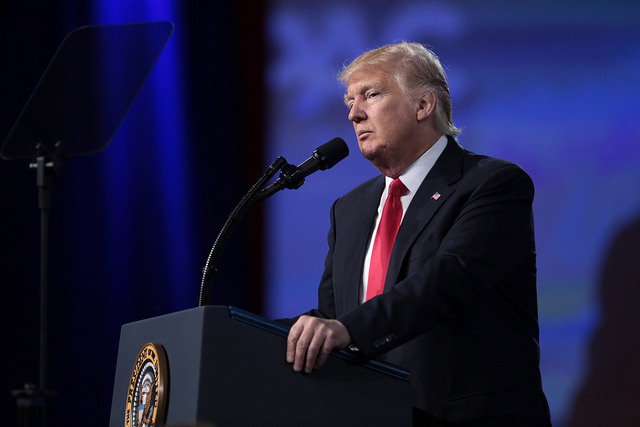
Will Trump’s decision on Iran end Europe’s servility?

In
If anyone doubted the need for an autonomous European foreign policy, Donald Trump’s decision to withdraw the US from the Iran nuclear deal must have convinced them. The EU and its Member States simply cannot follow the US in this, for the withdrawal is directly at odds with Europe’s security interests. It can only generate more instability in the Middle East and the Gulf, and Europe, not the US, is foremost at risk of suffering the consequences. Moreover, the EU would lose all credibility if it would now abandon its strong stance in support of the nuclear deal.
This commentary was first published in De Morgen.
(Photo credit: Gage Skidmore, Flickr)
*****
Will Trump’s Decision on Iran End Europe’s Servility?
If anyone doubted the need for an autonomous European foreign policy, Donald Trump’s decision to withdraw the US from the Iran nuclear deal must have convinced them. The EU and its Member States simply cannot follow the US in this, for the withdrawal is directly at odds with Europe’s security interests. It can only generate more instability in the Middle East and the Gulf, and Europe, not the US, is foremost at risk of suffering the consequences. Moreover, the EU would lose all credibility if it would now abandon its strong stance in support of the nuclear deal.
The EU does not need strategic autonomy because Trump is president, but because the world order has changed. During the Cold War, many states chose sides between the two great powers, the US and the Soviet Union. As long as that bipolar order lasted, what was good for America was more or less good for (Western) Europe. Today we are living in a multipolar world of multiple great powers and regional powers. Consequently, European and American priorities, and even interests, coincide far less automatically than before. Nobody is going to defend the European interest in Europe’s place.
That is why the EU must develop its own view of the world and translate it into an operational strategy. Of course, this is not the end of the Transatlantic alliance. In a world in which various great powers cooperate and compete with each other at the same time, the alliance with the US remains of vital importance to Europe. Other powers will certainly try to exploit the breach between the EU and the US over Iran. Nevertheless, this does hopefully signal the end of a certain servility towards Washington that is still ingrained in the European mind.
Now more than ever the EU must invest in the Transatlantic alliance. But at the same time it must send a clear message to the US: Europe has red lines too. And the EU must invest in partnerships (not alliances – not yet) with other powers, complementing its alliance with the US, in order to pursue its priorities with all possible partners.
The EU has already announced that it will continue to uphold the nuclear agreement with Iran. The top priority now is to convince Iran to do the same and not to give in to the American (and Israeli) provocation. It is precisely because Iran has upheld its part of the deal that it has acquired a certain legitimacy. That will quickly evaporate, however, if Tehran now overreacts. Then the EU will have no option but to reintroduce sanctions as well. In order to convince Iran, the EU should try to cooperate with the other permanent members of the Security Council that negotiated the deal: China and Russia.
Maintaining the agreement means that European companies will be at risk of being targeted by American sanctions. It will without doubt further complicate other negotiations, such as those on the tariffs on European steel that the US wants to introduce. But that cannot be an argument to disregard the strategic interests of the EU. Furthermore, Trump was going to try and implement his protectionist agenda in any case, regardless of the Iran dossier.
What the EU still lacks, however, is a comprehensive strategy for the region. Several EU Member States are engaged militarily in the war against IS, but they have no clear political objective. What is the European view on post-war Syria and Iraq? Which regional order does the EU think possible in the Middle East and the Gulf, and what will be the place of Iran, Saudi Arabia and Turkey in that order? It has become very urgent now to develop a strategy, as much as possible in cooperation with the other powers that are involved.
Finally, the EU and the US ought to quickly identify an issue on which they can act together, in order to demonstrate to the other powers that their differences over Iran do not jeopardise the Transatlantic alliance as such. This is the new multipolar world: one cooperates on one issue, and competes on another. It may not feel very comfortable, but we better get used to it.
Prof. Dr. Sven Biscop, an Honorary Fellow of the European Security and Defence College (ESDC), directs Egmont’s Europe in the World Programme, and lectures at Ghent University.